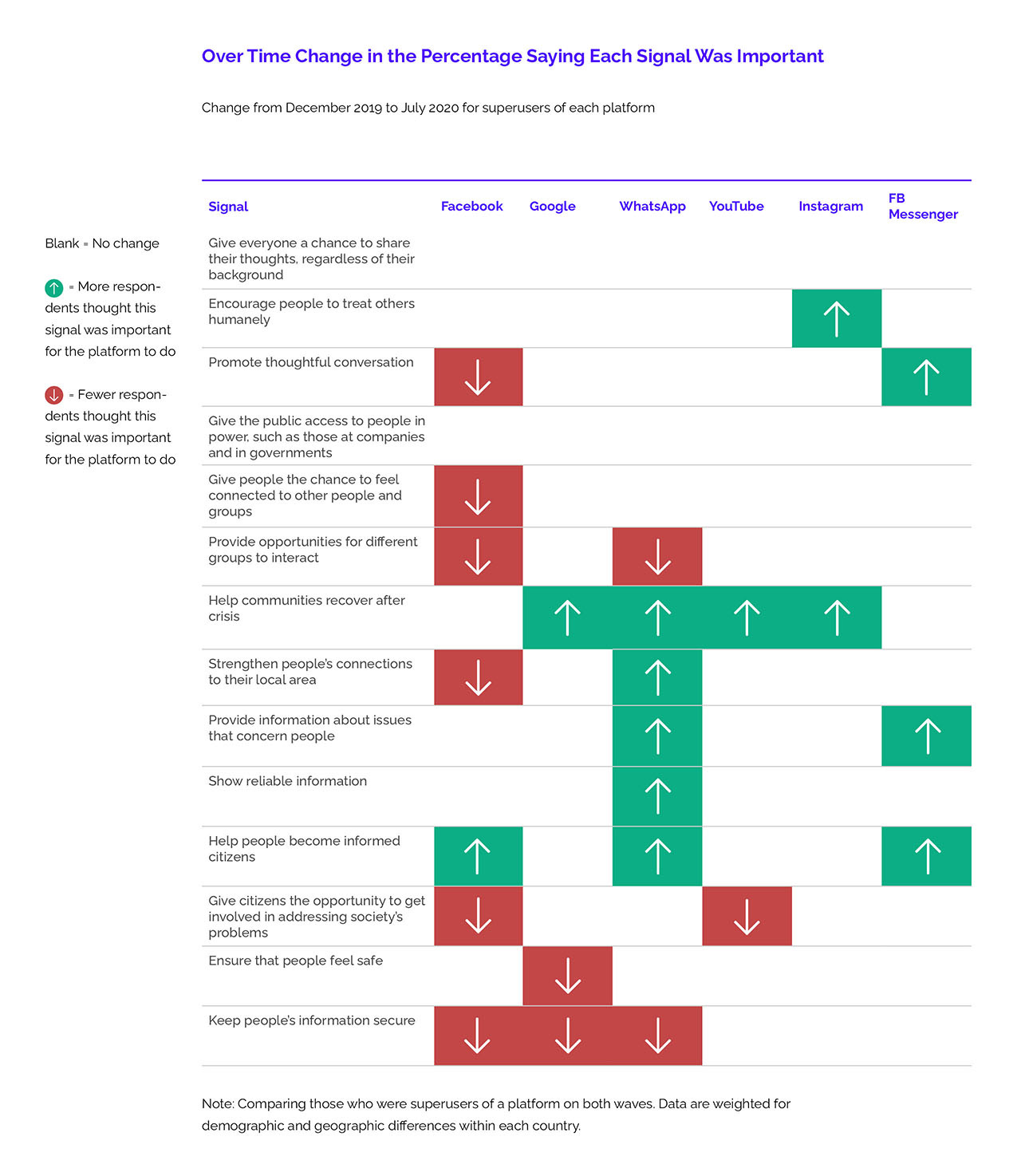💥New Report! Digital Platform Experiences During the Pandemic 😷
An expansion of our research into 14 signals for flourishing public spaces online
Download our report Digital Platform Experiences During the Pandemic.
Today we have an exclusive preview of our newest report, officially launching tomorrow, Monday, July 19, 2021.
In January we released the signals, a signature research project outlining 14 qualities for flourishing digital public spaces. We asked 20,000 people in 20 countries to tell us about their experiences with search, social and messaging platforms, and then we collected all that data and academic research into 400+ pages of whitepapers you can download and pour over at length.
There are four key building blocks: digital platforms should be welcoming and safe, help us understand and make sense of the world, connect people near and far across divides, and enable us to act together. Each signal is a quality of healthy digital spaces that academics and people in 20 countries agreed was important. They range from signals like Invite everyone to participate, to Boost community resilience.
That data, originally collected in partnership with YouGov in December 2019, set a baseline. It gave us great information, including how often users around the world used different platforms. We took our 14 signals, such as Encourage the humanization of others and Cultivate belonging, and asked users how important they thought they were for the platforms, and if they thought the platforms were doing a good job at performing each signal. Of course, an interesting thing happened not long after we did our original research in late 2019…
You know where I’m going with this. In July 2020, we went back to 3,368 of our earlier survey respondents from countries where we did focus groups (Brazil, Germany, Malaysia, South Africa, and the United States). Their answers gave us a great opportunity to see how the coronavirus pandemic has actually affected digital platforms. Are you ready to find out some results??
Uses of Platforms
Perhaps unsurprisingly, reported usage increased nearly across the board. Not only did more people report using nearly every platform (sorry Snapchat 😪), they turned to their digital communities for new reasons. You can probably think of anecdotes from your own life along the lines of what we saw in the data, including using platforms to “Connect with friends, family, and community members” and “seek out forms of entertainment, new skills, and hobbies.”
Changing Priorities
In many ways, the pandemic did not change expectations that users had for platforms. Even if the coronavirus kept us at home, it didn’t make us completely reconsider what our social, search and messaging apps should be doing. There were some exceptions, which make sense in terms of a global pandemic:
More superusers of the main six platforms we looked at, (Facebook, Facebook Messenger, Google, Instagram, WhatsApp, YouTube) wanted those platforms to help communities recover after a crisis and to help people become informed citizens than before the pandemic.
Some concerns were less important when considering the pandemic in summer 2020: Fewer superusers thought it was important for platforms to help different groups interact, to keep people’s information secure, and to give citizens the opportunity to get involved in addressing society’s problems.
Platform Performance
And despite increased use and mostly consistent priorities, the platforms largely disappointed in terms of the signals. No platform performed well for even half of the users we surveyed in any of the 14 signals. The individual scores ranged from what I might subjectively describe as “abysmal,” (just 6% of Facebook Messenger superusers believed that they could get help recovering from a crisis in their communities) to what could generously be called “nearly passing” (48% of WhatsApp superusers reported that they felt connected to other people and groups on the messaging app.)
If you’re reading this, it should come as no surprise to you that worldwide, some users of contemporary digital platforms find parts of the experience lacking. But here, we are starting to get a fuller picture.
Concerns and Implications
Users also reported a range of “disappointing digital experiences” they had on platforms during the pandemic. Many of these concerns have dominated headlines in the United States for years, such as “the prevalence of false information online.” Our researchers, in seeing the breadth of these concerns, have helpfully created their own list of implications for platforms, derived from this research. For example, they recommend “taking a proactive approach to labeling false information, prioritizing information from reputable sources, and providing in-depth explanations of fact-checking and moderation policies.” To see the rest of the concerns and implications, as well as complete methodological information, download the report.
You can now explore the new research page of our website, where in addition to this report, you can find our Terra Incognita NYC research.
Next week we’ll keep this research train a-rollin’ with an interview with New_ Public co-founder and co-director Talia Stroud, who led this research at the Center for Media Engagement.
We’re proud of this new research, and we’d appreciate your help spreading the word about it.
We ain’t too proud to beg: When we’re tweeting about this on Monday and Tuesday (that’s right, it’s important enough to break from #TuesdaysOnly!), we would genuinely appreciate a thoughtful retweet or original tweet from you. Thank you in advance. We really mean it!
Determining our p-value,
Josh Kramer
Design by me
New_ Public is a partnership between the Center for Media Engagement at the University of Texas, Austin, and the National Conference on Citizenship, and was incubated by New America.







